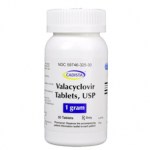- Type of Drug: Antiviral.
- Prescribed for: Herpes zoster infections.
Valacyclovir (Valtrex) General Information
Valacyclovir is rapidly converted to Acyclovir in the liver and intestine after it is absorbed into the blood. Although it is effective and approved for use against the two types of herpes virus infection (herpes zoster, which causes shingles, and varicella zoster, which causes chickenpox), studies of this drug have been mostly in shingles. Valacyclovir works by inhibiting and inactivating an enzyme that is key to viral reproduction and by affecting the growing viral DNA chain.
Valacyclovir (Valtrex) Cautions and Warnings
Do not take Valacyclovir if you are allergic to it, Acyclovir, or any component of the tablet.
Some people with advanced HIV disease or who have had a bone marrow transplant or an organ transplant developed a potentially fatal condition known as TTP while taking Valacyclovir. This drug should not be taken by anyone with AIDS or others with a compromised immune system.
High doses of Acyclovir taken over long periods of time have caused reduced sperm count in lab animals, but this effect has not yet been reported in humans.
Possible Side Effects
- Most common: headache, diarrhea, dizziness, weakness, constipation, abdominal pain, appetite loss, nausea, and vomiting. These effects are comparable to those seen with Acyclovir.
- Less common: aching joints, tingling in the hands or feet, stomach gas, fatigue, rash, feelings of ill health, leg pains, sore throat, a bad taste in the mouth, sleeplessness, and fever.
Valacyclovir (Valtrex) Drug Interactions
- Cimetidine and Probenecid slow the rate at which Valacyclovir is converted to Acyclovir, but this does not change the drug’s effectiveness. Valacyclovir dosage does not need to be changed if you are also taking those drugs.
- Cimetidine and Probenecid may decrease Acyclovir elimination from your body and increase drug blood levels, raising the chance of drug side effects.
- Taking Valacyclovir and Zidovudine (AZT) together may lead to severe drowsiness or lethargy.
Food Interactions
Valacyclovir may be taken without regard to food or meals.
Usual Dose
Adult: 1,000 mg 3 times a day for 7 days. The dose is lowered in people with kidney disease.
Valacyclovir (Valtrex) Overdosage
There have been no cases of Valacyclovir overdose. Acyclovir overdose, though, is likely to lead to kidney damage caused by the deposit of drug crystals in the kidney. Up to 4.8 grams of Acyclovir a day for days has been taken without serious adverse effects.
Valacyclovir (Valtrex) Special Information
Treatment with Valacyclovir must be started as soon as possible after your shingles is diagnosed. All of the information on the effectiveness of this medicine was gathered from people who started treatment no more than 72 hours after diagnosis.
Women with genital herpes have an increased risk of cervical cancer. Check with your doctor about the need for an annual Pap smear.
Herpes can be transmitted even if you don’t have symptoms of active disease. To avoid transmitting the condition to a sex partner, do not have intercourse while visible herpes lesions are present. A condom should protect against transmission of the virus, but spermicidal products or diaphragms won’t. Acyclovir alone also does not protect against spreading the herpes virus.
Call your doctor if the drug does not relieve your condition, if side effects become severe or intolerable, or if you become pregnant or want to begin breast-feeding.
Check with your dentist or doctor about how to take care of your teeth if you notice swelling or tenderness of the gums.
Valacyclovir (Valtrex) Special Populations
Pregnancy/Breast-feeding
Acyclovir crosses into the circulation of a developing fetus. Animal studies of Acyclovir have shown that large doses (up to 125 times the human dose) caused damage to both mother and developing fetus. While there is no information to indicate that Acyclovir affects a developing baby, you should not use it during pregnancy unless it is specifically prescribed by your doctor and the benefit outweighs the possible risk of taking it. The manufacturer of this drug maintains a registry for pregnant women taking this drug to keep track of how it affects birth outcomes.
Nothing is known about the effects of Valacyclovir in nursing mothers, but Acyclovir passes into breast milk at concentrations up to 4 times the concentration in blood, and it has been found in the urine of a nursing infant. No drug side effects have been found in nursing babies, but mothers who must take Valacyclovir should consider bottle-feeding their infants.
Seniors
Valacyclovir has been studied in healthy seniors aged 50 years and older. People over 50 years of age with shingles tend to have more severe attacks of that condition and may benefit more from Valacyclovir treatment when the medicine is started within 48 to 72 hours of the appearance of the first rash. Seniors with reduced kidney function should be given a lower oral dose than younger adults to account for normal reductions in kidney function that occur with aging.

